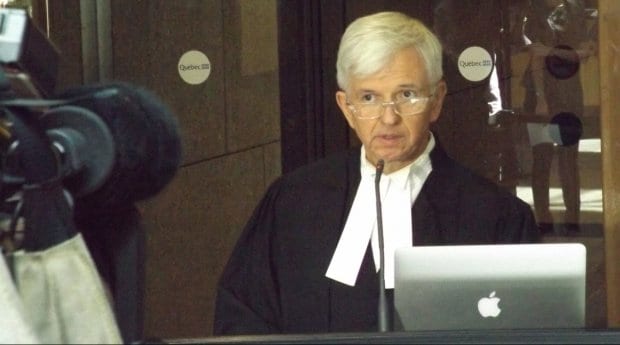Jury selection began Sept 8 for the trial of Luka Magnotta at Montreal’s Palais de Justice, where the first 400 out of 1,600 potential jurors were screened for their ability to hear the shocking case.
Magnotta appeared in court behind a glass partition in ill-fitting blue prison scrubs, weighing obviously more than he did when he was arrested two years ago — he now carries a significant paunch despite his rail-thin arms, and his face seems rounder under his close-cropped, unkempt hair.
In a scrum during a break, Magnotta’s lawyer, Luc Leclair, described him as being “shocked by what’s going on” but refused to elaborate.
Magnotta is accused of murdering 33-year-old Jun Lin in May 2012, allegedly dismembering his body and mailing parts of it to Conservative and Liberal party headquarters. He’s facing charges of first-degree murder, improperly or indecently interfering with or offering an indignity to human remains, publication of obscene material, mailing obscene material, and criminal harassment of Prime Minister Stephen Harper and members of Parliament.
It is expected to take two weeks to find 12 jurors and two alternates from among those summoned. The trial is scheduled to begin Sept 22 and is expected to last six to eight weeks.
Day one of jury selection saw hundreds of potential jurors released from duty. Magnotta, a native of Toronto, has requested a trial in English, although some evidence will be presented in French. Accordingly, jurors must be completely bilingual, and even in Montreal finding fluently bilingual people is not always easy. Hundreds were exempted on day one because they didn’t believe their English was sufficient.
Other jury candidates requested exemptions because of work or school obligations, health concerns, because they are the sole caregiver to a child or parent, or because spending the length of the trial living only on the $90 per day allowance granted to jurors would cause a financial hardship.
Jurors do not need to have avoided all media coverage of the case but must be able to maintain an open mind and to base their verdict only on evidence heard in the court, not on reports seen in the media. They also must not have personal knowledge of or connections to the case.
Many candidates found even that low bar difficult to surmount.
One woman told Justice Guy Cournoyer that she believes Magnotta should have been castrated two years ago.
A young man was visibly shaking as he told the judge he had been having anxiety attacks all week after learning he was being called in for the Magnotta trial. “Just to look at the evidence . . . I can’t stand the idea of looking at these pictures. I’ve been nervous all week,” he told the judge in French.
Another woman was exempted because she attended the memorial service for Jun Lin.
Jury members will not be sequestered during the trial.


 Why you can trust Xtra
Why you can trust Xtra


